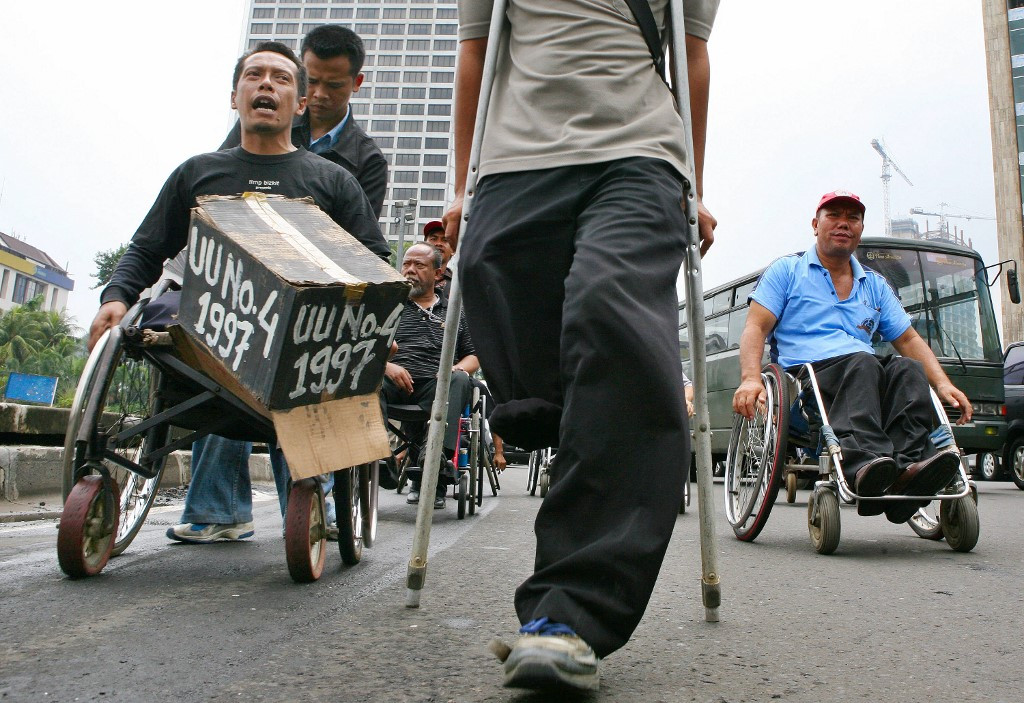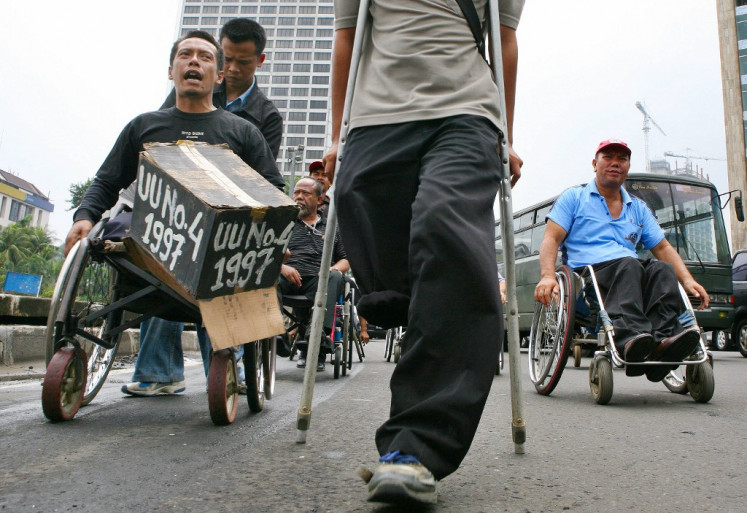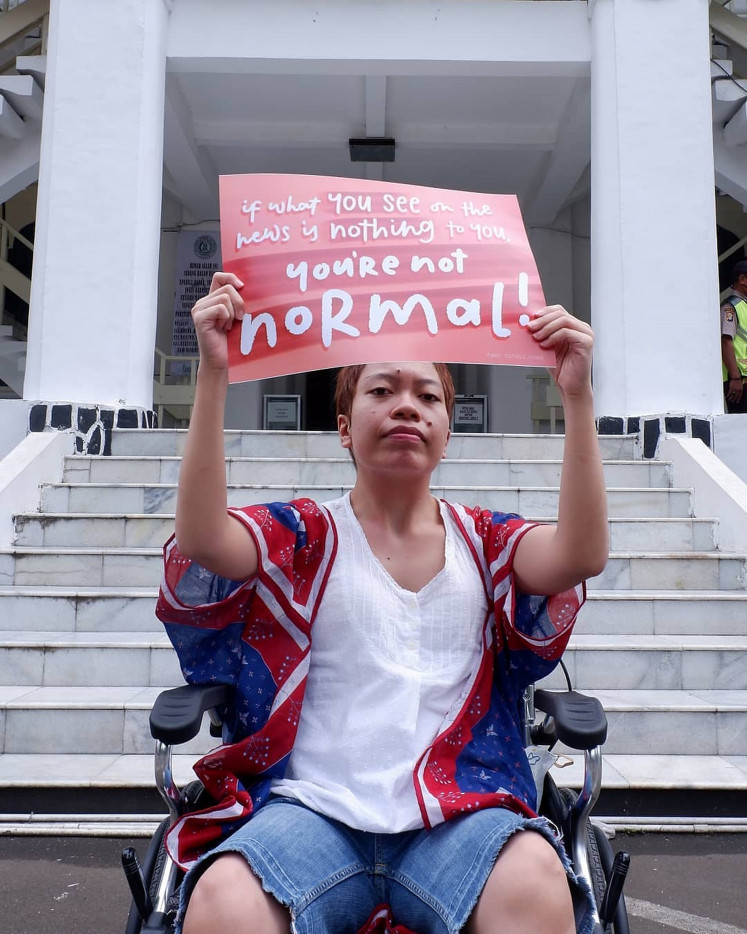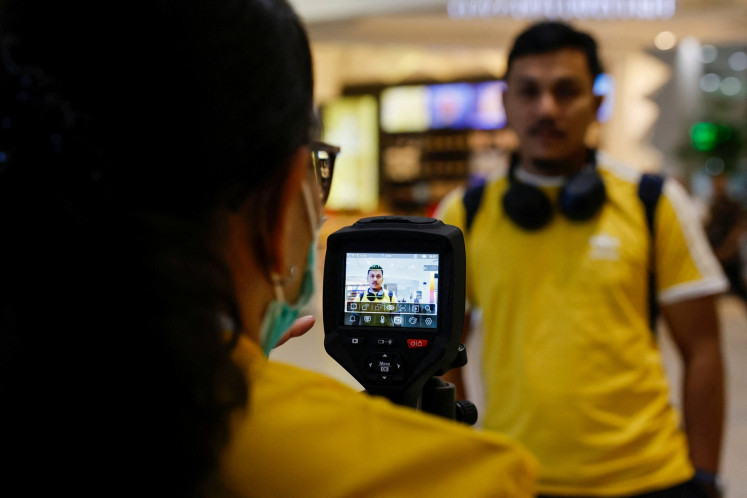Popular Reads
Top Results
Can't find what you're looking for?
View all search resultsPopular Reads
Top Results
Can't find what you're looking for?
View all search resultsPeople still meeting public barriers to disability access, rights
Change text size
Gift Premium Articles
to Anyone
W
hile some progress has been made in making public places more disability friendly, much work remains to be done to guarantee the rights of persons with disabilities.
Ilma Rivai was born with cerebral palsy, which left her unable to walk. Her parents chauffeur her whenever she leaves the house.
Because of her condition, Ilma is entirely dependent on a wheelchair to get around. As a young woman who is involved in a lot of activities, however, getting from one place to another is not always easy, including entering and exiting the building where she works.
“The ramp is narrow and a bit steep. It doesn’t fully accommodate a wheelchair. To enter [the lobby], I always rely on help from others,” the 26-year old told The Jakarta Post on April 16.
When a 6.6-magnitude earthquake rocked Jakarta in mid-January, she found it difficult to evacuate the building.
"My previous [workplace] was located on the sixth floor. It was impossible for me to get down the stairs,” said Ilma, who works at a development consulting company in Central Jakarta. “The power to the elevator was turned on for a very short time before it was turned off again” so she could leave the building.
Universal rights: Disabled people demand equality during a street rally in Jakarta on Dec. 3, 2007 to mark the International Day of Disabled Persons. (AFP/Ahmad Zamroni) (AFP/Ahmad Zamroni)Like Ilma, 22-year-old psychology student Athiyya Larasati was also born with a disability and uses a walker to help with her mobility. Nevertheless, she still faces obstacles in accessing certain public places.
“There are many stairs and steps at a volunteer center in South Jakarta,” said Athiyya, explaining that they restricted her access.
“Not all malls are equipped with elevators [...] they have escalators. It's impossible for me to move the walker onto the escalator because I would lose my balance and risk falling,” she added.
Long journey to inclusiveness
In 2016, the government passed Law No. 8/2016 on persons with disabilities, which provides a legal guarantee for disabled people's right to accessibility. It also obligates the state at all levels to accommodate persons with disabilities. But the reality shows that a lot of work needs to be done to ensure that disabled people enjoy the same rights as everyone else.
Ahmad, a 31-year-old amputee cyclist, said that the biggest and most frequent challenges he faced were lack of assistance from staff and poor infrastructure at train stations.
“I have difficulty when transferring my folding bike from the platform to the train car and vice versa,” said Ahmad, who has been using the railway service since 2015.
Station attendants were “often unaware” that he needed assistance, he continued, adding that some train stations in Jakarta had steep steps and ramps, but didn’t have elevators, which made access more difficult for persons with disabilities.
Ahmad also emphasized the importance of safe bicycle lanes with protective barriers, given that non-cyclists’ use of bike paths could pose a danger to cyclists.
“Serious [law] enforcement is necessary so bicycle lanes are only used by cyclists. Non-cyclists who ride in bicycle lanes should be fined,” he said.
One for many: Ilma Rivai, 26, who was born with cerebral palsy, is a disability rights activist who represented women with disabilities at the Women's March rally in Jakarta. (Courtesy of Ilma Rivai/Dida Fisandra) (Courtesy of Ilma Rivai/Dida Fisandra)Pedestrian infrastructure also poses a barrier to persons with disabilities. Wheelchair users need access ramps connecting streets and sidewalks, but even navigating the city’s sidewalks is not easy, according to Ilma using a wheelchair.
“In my opinion, the sidewalks are still not disability friendly because there aren’t enough flat ramps. Most of them are steep. When I participated in a Women’s March rally, a police officer helped me” with a ramp, recalled Ilma.
Deliani Siregar, the senior urban planning, gender and social inclusion associate at the Institute for Transportation and Development Policy (ITDP), explained that sidewalk ramps was a key concern among persons with disabilities.
"There is a difference in height between the sidewalk and the road surface. If disabled people need to cross or move [from one sidewalk to another], they definitely need a ramp. A lot of ramps are constructed carelessly, and this problem isn’t only in Jakarta,” she said.
The ITDP and several other nongovernmental organizations that focus on disability issues, including accessibility, are pushing the Public Works and Housing Ministry to amend Ministerial Circular No. 02/SE/M/2018, which provides technical guidelines on planning pedestrian facilities. One of the key issues they have highlighted is the maximum slope of accessibility ramps, according to Deliani.
In addition to people with physical disabilities, people with visual impairments also have difficulty accessing public spaces. To ensure that they can walk safely, visually impaired people need tactile guidance and orientation systems that have raised patterns they can feel with their feet.
“In Jakarta, not all roads have [tactile paving]. Even if the sidewalks are equipped with tactile guidance, many are installed incorrectly,” said Deliani.
Another barrier to visually impaired people faced is the lack of accessible information.
“In our country, there’s hardly any audio information in the streets that cater to the needs of visually impaired individuals. This problem can be mitigated by providing braille street signs,” Deliani said.
Disability awareness
Poor awareness of disability rights can also contribute to a negative perception of persons with disabilities.
“Many people are surprised after they learn that I do a lot of activities outside my house. Many also ask why I have to spend time outdoors,” said Athiyya.
Disabled people have the same rights as all citizens, and guaranteeing these rights will give them more opportunities in life.
“When leaving the home is an obstacle, their chance of [exposure to] wider opportunities is low,” said Deliana, pointing out how persons with disabilities were productive despite the barriers they encountered on a daily basis.
“The Indonesian Blind Union [Pertuni] told me that many of their members sell traditional kerupuk [fish crackers]. Most of them live in Bojong Gede [subdistrict, Bogor]. They take the train, walk and face various challenges.
“The Bojong Gede train station doesn't have proper accessibility, so the station attendants assist them,” she said.
These Pertuni members also picked up their kerupuk consignment in South Tangerang, Banten, before heading to Jakarta to sell them.
Ilma said employers should also get involved in the effort to improve disability access through a better recruitment process.
"Employers need to hire disabled individuals,” she said, so they could gain direct feedback on the improvements they could make in the workplace.













